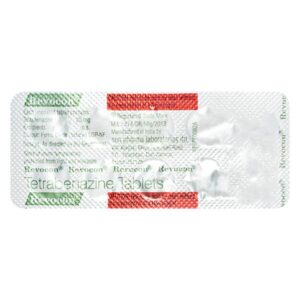TETRABENAZINE
TETRABENAZINE: Tetrabenazine is a medication used to treat certain movement disorders, such as Huntington’s disease and tardive dyskinesia. It is classified as a vesicular monoamine transporter 2 (VMAT2) inhibitor.
The mechanism of action of tetrabenazine involves blocking VMAT2, which is responsible for packaging and releasing dopamine, serotonin, and norepinephrine into nerve cells. By inhibiting VMAT2, tetrabenazine reduces the amount of dopamine available for release, which helps to regulate excessive movement.
The dosage of tetrabenazine depends on the specific condition being treated. For Huntington’s disease, the usual starting dose is 12.5 mg once daily, with the dose gradually increased until the desired effect is achieved or side effects become intolerable. The maximum recommended daily dose is typically 100 mg. For tardive dyskinesia, the starting dose is generally lower, around 12.5 mg twice daily, and can be increased up to 100 mg per day.
Common side effects of tetrabenazine may include drowsiness, fatigue, depression, restlessness, anxiety, and nausea. Other possible side effects may include parkinsonism (symptoms similar to Parkinson’s disease), akathisia (a feeling of inner restlessness or inability to sit still), and suicidal thoughts or behavior. It is important to mention that tetrabenazine may increase the risk of depression and suicidal thoughts, so close monitoring is required during treatment.
Tetrabenazine may also interact with other medications, such as monoamine oxidase inhibitors (MAOIs) and reserpine, increasing the risk of serotonin syndrome. It is important to inform the healthcare provider about all medications being taken to avoid potential drug interactions.
Overall, tetrabenazine is a medication that acts by regulating dopamine release and is used for the management of movement disorders, such as Huntington’s disease and tardive dyskinesia. However, it is important to carefully weigh the potential benefits against the side effects and risks before starting treatment. Close monitoring is necessary, especially for mood changes and suicidal thoughts.

